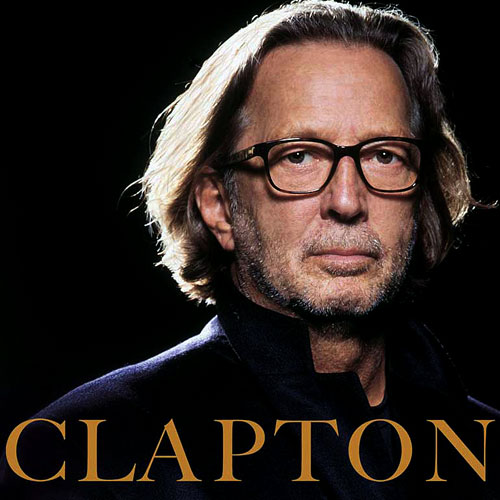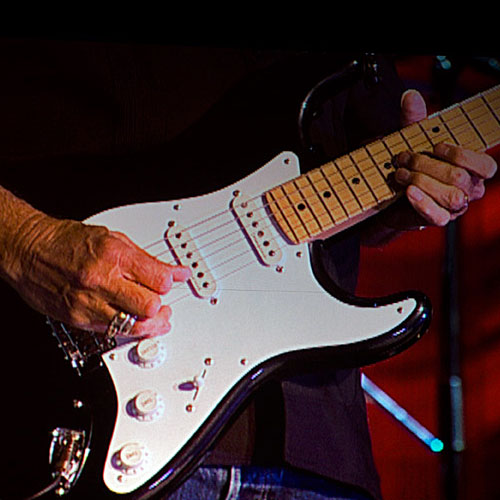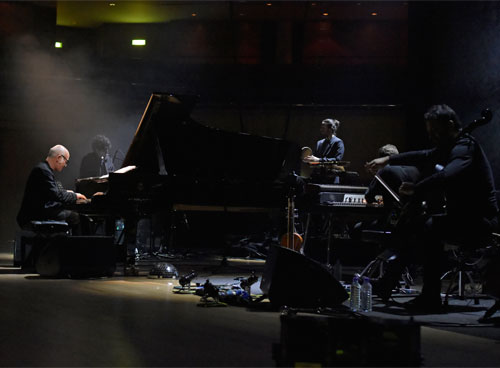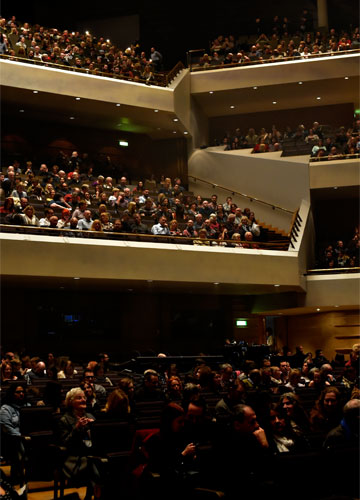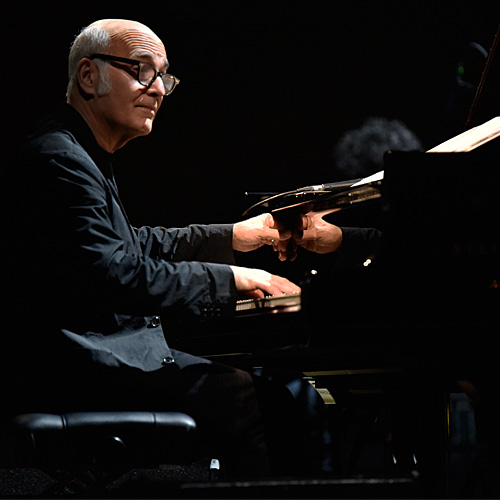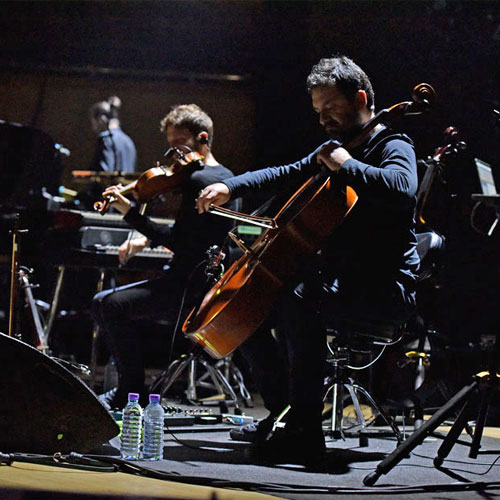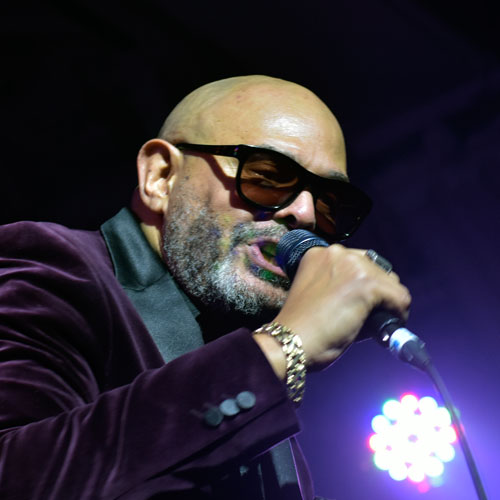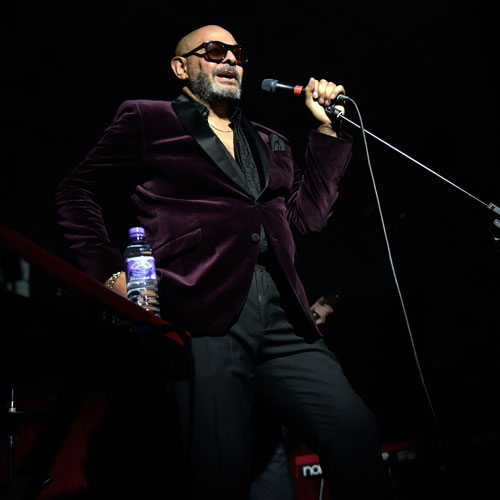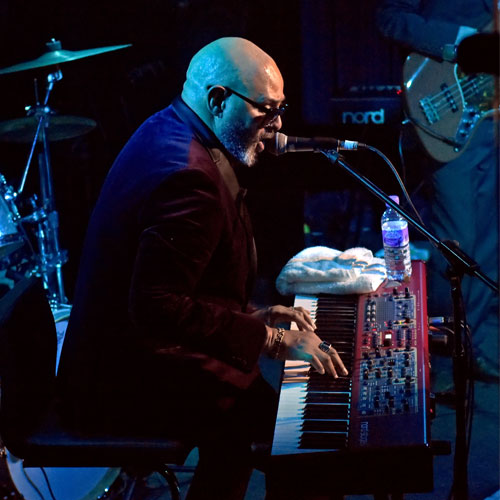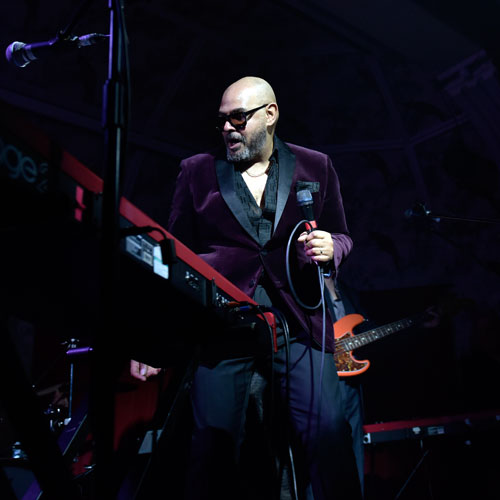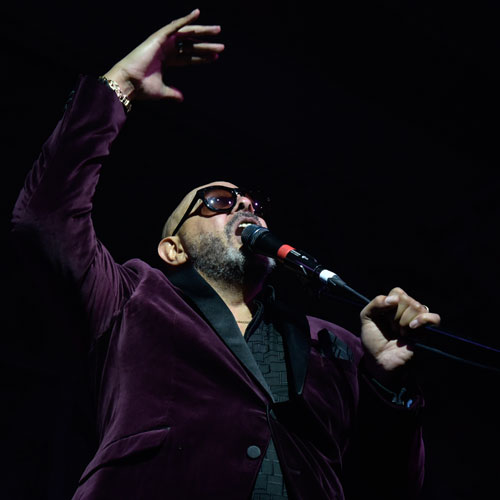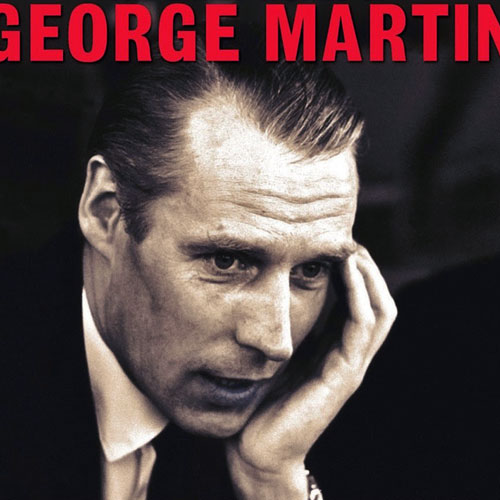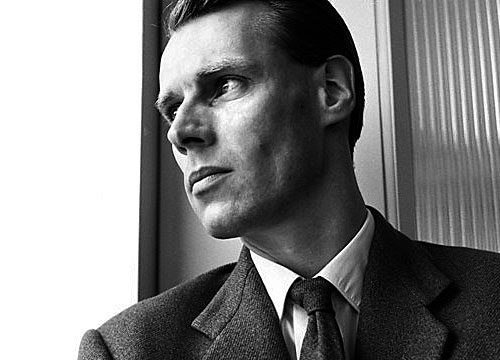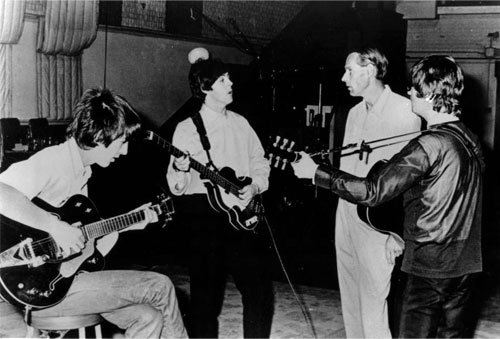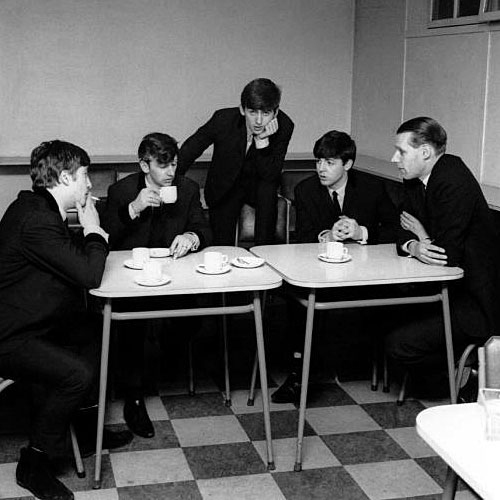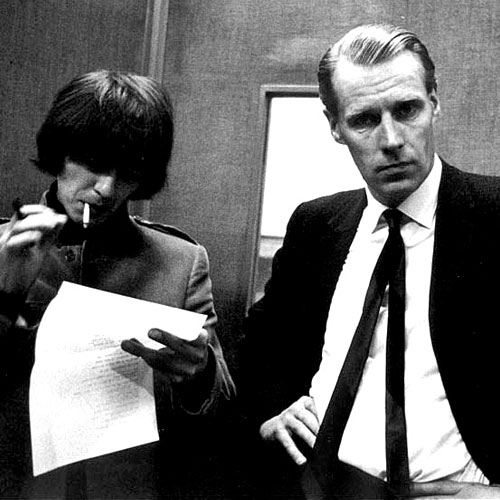Clapton, The Blues & Robert Johnson
Thank you for spending some time with us today Eric. I guess we should start at the very beginning, which is when you first became aware of Robert Johnson, how he affected you and, how he came into your orbit, so to speak?
Well, I think my earliest recollection of hearing Robert Johnson was around the time I was 15 or 16 years old. I was in arts school in Kingston. I had run into a small group of guys who liked Blues and R&B and Folk music. There was a few people playing around in the coffee bars and such like, and by then, I’d already developed an appetite for Folk Blues. I liked Big Bill Broonzy and I had seen Josh White play in London, and I had seen Sonny Terry and Brownie McGhee on TV when I was really young. So I’d been exposed to it and I was becoming interested in it and I had heard a few people. Someone had this album, King Of The Delta Blues, and I forget who it was now but it was one of blues aficionados. And I was just starting to learn how to play finger style acoustic, you know? And little bits of Broonzy and some other standards, like Nobody Knows You When You’re Down And Out, things like that. And this person who had the album lent it to me and I think we listened to it together, first of all. And I found it incredibly difficult to listen to. I also found Blind Lemon Jefferson very difficult to listen to.
I think it was because I had been introduced to Blues in a much more commercial way. I mean for instance, Big Bill Broonzy, who was very big in Europe, had learned how to really cultivate his music to appeal to a wider market. He was touring all over and playing to white audiences and I’d figured out how to make it acceptable, or just to make it simpler, in some respects so that it was more accessible. Robert Johnson had none of that because of what he did was so long ago and it was in a way I loved; it was almost like purely for himself. Now, maybe that isn’t the case but I got the impression first time I heard it that I was listening in on a very private conversation of some kind. It kind of turned me off first, and then I found I had to keep going back to it. And each time I went back to it, I liked it more and more, until it became the only thing I could listen to for quite a long time. It was the sort of cornerstone of my musical, my mental music archive, if you like. And so everything else had to relate to that and I would always come back to that.
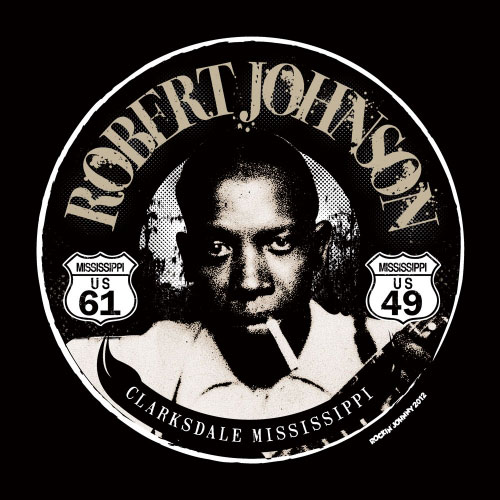
It took you time, actually, to be ready to listen to Robert Johnson, didn’t it?
Yeah. The first things I heard as a kid were all kinds of anything that was to do with an emotional expression. It could be opera, it could be rock ‘n’ roll. It could be jazz. But I was always attracted to powerful expressions of emotion. So I kind of went all the way around the houses and was really into Buddy Holly and Elvis and all of that stuff, until I got into Chuck Berry and edging towards Blues. But I had to kind of prepare myself for it, really.
And you mentioned the emotion. I mean, Robert’s emotion is kind of, you hear personal pain in his voice. What do you think it was? What did you hear it in, emotionally? What do you think immediately identified with you? I mean, some of the parallels in his life, in your life, you know, there’s a couple of them, that are pretty interesting. Do you think that was contained in the music, somehow, and that’s what you identified with?
Trying to define what it is about Robert Johnson is very difficult, except to say I think what becomes clear is that if I compare him to other of his contemporaries, like Son House and Charley Patton (I have to say Son House would be an exception because he’s so much more raw than any of the others). But what I got about Robert Johnson was that it sounded like he was not making any concessions to anybody in what he was doing. And it’s quite clear, historically, that most people, most black people of that time, were kind of coerced to a certain extent into being entertaining for whoever their audience was. That there would have to be a certain amount of compromise made. I didn’t get that from his music and I don’t have any proof that that was the case. But then there really isn’t that much evidence or information about him anyway. I just felt, intuitively, that he was being really truthful to himself, and he was writing kind of poetry about the way he felt. That was fairly commonplace but his was somehow much more adult, in a way, than anybody else’s. And he wasn’t trying to be cute. There was only a couple of tracks where I felt that he was kind of playing light, you know? But a lot of the time when he was writing about deep stuff. The first time I heard Hellhound On My Trail, I would avoid that track because it was too, too painful, you know? And only now, really, can I listen to that.
He always talked about struggling with demons, whether it be women or whether he had to travel, or feeling literally that hellhounds were on his trail, which is why he liked to tour and travel so much, maybe? I know Keith Richards has said, when Brian Jones played him Love In Vain, that, ‘okay, that’s Robert Johnson and who else?’ Because he couldn’t believe. Can you explain what he meant by that?
Well, I’ve played a couple of Robert Johnson songs on stage live, with an acoustic guitar. And both times I’ve had to do it with the help of somebody else. We did a tour around the album I did called From The Cradle, where we did a whole Blues tour which would open with me doing Terraplane Blues. But I would have Andy Faithweather Low sharing the guitar load. Because, as Keith Richards pointed out, it’s almost impossible for one man to do what he’s doing on the guitar, let alone sing at the same time. And some of the things that he does as he’s singing, to accompany himself, are so opposed to the time that he’s singing in. I mean, it’s almost impossible, the only way you could imagine doing it if you did it all day, everyday for several years. I wish I could say that I was going to apply myself to doing his material like that but I don’t, you know? But that’s the way I imagine he did it. There’s so much hard work gone into what he did.
The refining of his art, and in what they say about the timespan that it was all supposed to happen, it’s almost impossible. I mean you got this story about Charley Patton and Son House singing and playing one year and then, a year or two later, there was this this master, the maestro came back and blew them all away. If you could apply yourself with that amount of dedication and you had a set repertoire, of course, it would be possible. But, the amount of determination and focus and commitment that is required is unbelievable.
So, therefore, we don’t believe the legend…
Well I choose not to. I mean I prefer to steer away from superstition and mystification of these things because I don’t know. It just think in a way it cheapens it all, somehow. If it’s as easy as that, then anyone can do it. You know? You just can’t sign your soul over to the devil and get what you want, or you become a genius or whatever. I don’t really know. I don’t buy into all of that. No, I don’t. I think he was just incredibly gifted and he found out how to make the most of that gift.
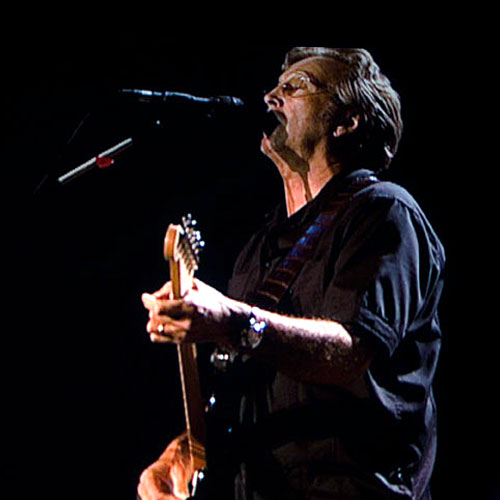
As you started playing music with bands, how did you reconcile it with yourself, to play his music ’cause I’m sure, at first, you were like, well, I’m not going to touch this, right?
Well, at the time that I was starting to become involved in the musical direction of bands, which was around John Mayall and actually all of my career I’ve had that capability. But it wasn’t until I think we put this band, Cream, together, where it was much more kind of flexible outfit in that we could go in any direction, anywhere we wanted. We didn’t have any particular thing to live up to. We were going to do whatever we wanted. So I was bringing in material from Country Blues and trying to do a song called Outside Woman, which was a very old song and we did kind of arrangements. I found it intriguing and I still do, obviously, as you can tell, by what we’d just done with this album. I found it intriguing to take solo endeavours like that and arrange them for a band. And what we’ve done with this new album is an arrangement that is quite big; where there’s three guitars, keyboards, drums, bass and stuff. And that is a real challenge to me - to try and find the essence of the song when Muddy’s playing on the riff, and interpret it into it so that you can play in a band on stage. I think that’s a great thing to do. Apart from the fact that what we’ve talked about earlier, which is, it’s impossible to do on your own.
Ludovico Einaudi Live
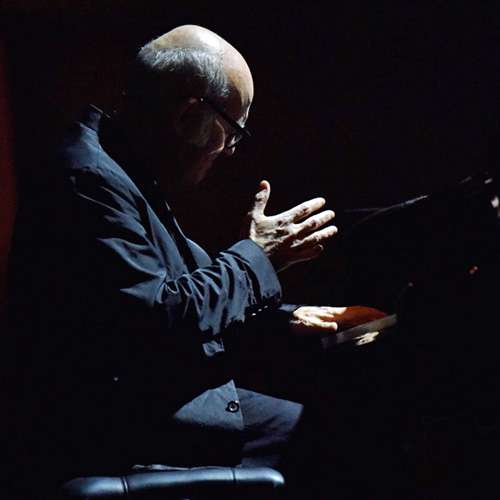
Bridgewater Hall, Manchester, 15 March 2016
“In his mingling of ambient, minimalist and cinematic strains, and his ear for a poignant melody, Ludovico Einaudi is the Italian equivalent of Michael Nyman, straddling classical, jazz, soundtrack and chillout… which develops a compelling momentum.” - Andy Gill, The Independent
Luminous, emotive, effortlessly lyrical and always supremely refined the music and performance of Ludovico Einaudi have attracted an ever growing audience over the last two decades whose diversity and devotion are without parallel. He has released a series of chart-topping albums , sells out the most prestigious concert halls worldwide, composed a string of award-winning film scores and routinely tops audience polls becoming an internet phenomenon. With a unique musical alchemy that draws on elements of classical, rock, electronica and world musics he has rendered traditional ideas of genre and audience divide obsolete and become not only one of the best known composers in the world today but almost certainly the best loved too.
“There is something in it that comes from classical, but I have influences from different music I have experienced in my life, from African music to folk and rock.”
Players
Ludovico Einaudi - piano
Federico Mecozzi - violin, guitar, keyboard
Redi Hasa - cello
Alberto Fabis - live electronics, bass, synth
Francesco Arcuri - guitar, waterphone, percussion
Riccardo Lagana - steel drum, percussion, vibraphone
A few years ago I was lucky enough to review and photograph an Italian artist who has, hugely successfully, vocaslly bridged the genres of opera and popular music. Andrea Bocelli is uniquely equipt to sound convincing at the top of the world’s pop charts or performing opera at La Scala (although to some ’serious’ critics he has no right to…). The reason I mention this is that Italian Ludovico Einaudi has parallels with this instrumentally. Classicly trained Einaudi’s ELEMENTS album released in 2015 is arguably his most modern set of compositions to-date while still including strong pointers to his classical heritage.
“Nature’s elements (earth, water, air, and fire), mathematical and scientific elements, musical forms and works of arts including those by Kandinsky. ELEMENTS brings these seemingly disparate elements together into one concept. Performed by Einaudi and his band the album includes his trademark piano melodies and stirring ensemble playing.”
Tonight’s concert is being held at Manchester’s wonderful Bridgewater Hall venue. As I wait by expansive stage I look back at the auditorium with its raised, crowded galleries which reach ip to the heavens the heavens (usually some of the highest in the country’s venues). A single, monotone piano note plays providing a fairly solid clue as to what is about to follow on stage. Eventually the music changes to something more orchestral as the lights dim to darkness and band members, five in all, take their places behind cello, violin, keyboard, percussive and other unseen instruments. Tonight’s concert is in two halves separated by a twenty-minute intermission. The first includes songs from the new ELEMENTS album. The second half includes music both new and old.
Through the dim dark I see a figure walking slowly towards the centre-stage piano. Einaudi sits with his back to the capacity, clapping audience. Now I’m only allowed two songs to photograph and witness but I manage to stay for two further songs before I’m politely removed. However, it’s enough to establish the quality and surprising accessibility of this quite unique artist. In addition, I’m impressed with his five skilled, young musicians without whom the pieces would be incomplete and less dramatic.
Through my long lens I watch Einaudi’s face and hands to see emotion and expression. Twice I see him gently brushing his hand along the piano above the keyboard while playing, perhaps in tune with the song’s rhythm or some emotional outpouring…The music is breathtaking, subtly melodic and at times strongly rhythmic, at times classicly lyrical. ”Drop” opens and builds from glacially slow piano notes until eventually strings join before a epic percussive notes end the piece. It could have hardly have been more mesmerising or emotive. “Whirling Winds” is a fine illustration of a descriptive narrative. The opening piano notes sound like a gentle breeze but then gather pace as other instruments join to create the most epic and beautiful crescendo of sound.
“Petricor” opens with relentless slow rhythmic piano notes behind mournful and reflective violin and cello util the pace picks up quite dramatically when percussion also joins the fray. It’s a epic, stunning, spine tingling piece that builds and builds before slowing down to a trickle of piano and string notes then picking up rampant pace again. A crashing crescendo arrives before the final slowing piano notes melt away to nothing. ”Night” is arguably Einaudi at his most melodic, accessible and lyrical. It’s a gently flowing composition that sounds like a rippling stream. It’s punctuated by more solidly struck notes and eventually a chorus of swaying strings that transport into the next set of tumbling piano notes and back again. It has to be a major highlight of the evening.
Listening to an album one seldom gets the whole story. With Einaudi’s ELEMENTS I think this is particularly true and tonight proves it. With the album’s cover forming the show’s main gigantic video backdrop, the songs I witness come to life in this glorious live environment. To put it simply, I’m blown away; captivated, enthralled and very moved.
Jeff Buckley’s New LP
Jeff Buckley YOU AND I. Columbia Legacy/Sony
Music Recently discovered in the vaults – 10 previously unreleased and virtually unheard studio recordings. Including covers of Bob Dylan, Sly & The Family Stone, The Smiths, Led Zeppelin, Bukka White and Jevetta Steele, in addition to the first ever studio recording of his signature song ‘Grace’ and ‘Dream Of You And I’, an unheard original recording which informs the deeply intimate and profoundly personal mood of the album. These recordings represent the breadth of Buckley’s influences and talent for interpretation. Recorded prior to the sessions which would become his seminal debut album ‘Grace’, these tracks offer a unique insight in to the creative process of a developing genius and inimitable emerging talent.
The Columbia/Legacy release of Jeff Buckley’s You and I has been overseen by the artist’s mother, Mary Guibert.
“The recordings we have are Jeff’s true remains We should treat them as we would prepare his body for burial - no makeup, no Armani suit, leave the green glitter toenail polish on, and don’t cut or comb his hair.”
There’s always the fear, even amongst Buckley’s most ardent fans, that recordings such as these ‘from the archives’ turn out to be nothing more than poorly recorded demos that would never have seen the light of day if JB was still alive. I have to admit that on walking into HMV and (surprisingly) seeing this I was both excited and fearful…I needn’t have been.
In fact, for me at least, this collection of demos recorded before the release of GRACE is one of the most eye-opening. Its acoustic simplicity and undecorated production have resulted in the purest of recordings where guitar and voice really do send shivers…In fact any audiophile would proclaim tis as a must-have recording - it’s that good.
It opens with Dylan’s “Just Like A Woman” and a long guitar strum introduction that is one of the best I have heard from any source. Its clarity is stunning and it’s pure Buckley. Then that voice enters, that distinctive and utterly beautiful voice. It floors me. Everything unique and great about JB is showcased in this one, first album track.
Sharp percussive clicks and brushed guitar notes introduce Sly And Family Stone’s “Everyday People”. Now this is not one of my favourite songs but JB makes it his own with this very different blues-tinged interpretation. It’s followed by “Don’t Let The Sun Catch You Cryin’”. It’s stripped down blues with just the hint of guitar in the background. It’s the first time I’ve heard this Ray Charles composition but JB’s intimate rendition is good enough to seek out the original…
“Grace” then arrives in all its live, unadorned and spectacular glory. It’s a killer that I suspect will bring a tear to the eyes of devoted fans. That distinctive voice that travels the scale and octave levels is unadulterated emotion and passion. I doubt whether any song in history (outside of opera) sounds like this particular recording.
“Calling You” (by B. Telson) is mellower, smoother, quieter but no less emotional as interpreted by JB. It’s a reflective performance almost stripped of instrumentation. It’s utterly beautiful. Then comes the second JB original in “Dream Of You And I” which comes with his own spoken introduction/explanation (could he be talking to an A&R man?). A few minutes into a rather vague musical opening and he stops to add a further explanation which includes lovers talking to each other during an AIDS rally in a USA college event.
“The Boy With A Thorn In His Side” is a Smiths song that passed me by, until now. However, I ask whether this song is well covered by JB and I suspect it is. His voice wanders the scale and reaches impossibly high notes that a soprano would be proud of! “Poor Boy Long Way From Home”, a traditional blues song, comes complete with authentic guitar sounds that are stunning and recorded as if from way back then. Buckley also sounds very different - never heard him like this before.
The album ends with Led Zeppelin’s “Night Flight” and another (fitting) Smith cover in “I Know It’s Over”. Both interpreted in Buckley’s unique and fabulous way with the latter lyrics (”Oh mother I can feel the soil falling over my head“) and vibe possibly inspiring JB to write “Lover, You Should’ve Come Over” from the album GRACE.
For younger music lovers, aspiring musicians and everybody else this is an essential, intimate album.
4.5/5
Barry Adamson Live Manchester
Deaf Institute, Manchester, 9 March 2016
I am not and never have been a ‘music historian’ who knows every twist, turn and influence of an artist’s history/background. Perhaps that’s because I’m more interested in the music of the moment; its quality and meaning. Although I am aware of Adamson’s name my only past connection with him is an album (I think which featured movie music) received many moons ago that I think I liked…The benefit of this shortage of knowledge is that I’m discovering new music and artists a lot of the time. And this occasion is no exception.
Adamson’s new album (KNOW WHERE TO RUN) was recently delivered and I loved its song-writing, performances and production. Then and only then did I try to find out more about the artist. I also discovered that he was performing at one of my favourite little Manchester venues - The Deaf Institute - favoured by many quality performers/writers.
The Deaf Insitute is full on the night and the small stage is packed full of instruments. At 9pm four band members mount the stage including bass and lead guitarists, keyboard player and drummer. Moments later a handsome and tall Adamson wanders in to huge applause and after a short greeting he launches into his new album with “Up In The Air”. Now I have read that Adamson is a formidable bass player who has graced the stage with many great bands, but tonight he seems to have forsaken this weapon in favour of his voice - for now.
It’s an explosive start to the show featuring one of the best songs off the new album. What’s interesting is that Adamson has opted for a song that includes strong instrumentation (as well as a powerful and expressive vocal), rocky vibe and rampant pace - the chance maybe for his band to warm up early. The overall effect was stormingly good. Adamson is a well-honed artist who knows his audience only too well so for the next two songs he’s back to his glorious past with “You Sold Your Dreams” and “The Sun And The Sea” from two much older albums. I thought it interesting that on Amazon the two albums are two of the lowest ratings but these two songs are extremely popular highlights (I would guess for him also).
The new “Evil Kind” wanders more gently along with a wistful, contemplative vibe and some nice backing vocal touches. The guy knows a good melody when he hears one and this is arguably one of the strongest on the new record. Love it! By now he’s moved to his keyboards and seated trotts out another powerful new tune, “Come Away”, a clear, folk-tinged song of huge quality and emotion. Hunched over his keyboard he gave the performance of the night, and of a song that should be bombing the airwaves of BBC Radios 1 & 2. Adamson joked about musical genres (or their lack of importance - he has been involved with many of them including Alternative rock, Post-punk, Electronica, Post-rock, Acid jazz, Soul jazz and Lounge music) and that he had been asked to perform at a massive venue but opted for this very small one…There’s a distinct warmth to this performance and an almost childish enthusiasm which connects solidly with his audience.
Up to that point I had already established that Adamson was pretty special but the next song floored me. “Claw And Wing” repeated the contemplative, emotive and beautiful sound with a song of glacial pace and huge melody. It’s a jazzy ballad that could so easily have been on a Frank Sinatra record and Adamason’s performace is just as good. The artist’s band is so perfect with backing vocals and instrumentals in total tune with the song’s gentle, rolling vibe.
The new “Mr Greed” is next and a sure sign that the new album is autobiographical. It’s a jagged song with bustling bass line and underpinend by relentless keyboard notes. “Cine City” is no doubt a reflection on his past soundtrack experiences mixed with life’s more pleasurable (and worrying) things (”We’re headed south to New Orleans/We were spending more money than the Black-Eyed Peas“). It’s a rocky interlude with those drums dominating proceedings.
Adamson could have played for several hours more judging by his mood and audience reation but an hour and a bit later and after two encores (including the only Magazine song - ‘Thank You’) it was over. This was a hugely accomplished performance by a mature artist and song-writer that almost seen it all and come out the other end with arguably one of his very best albums, and a show to remember.
SETLIST
Up In The Air
You Sold Your Dreams
The Sun And The Sea
Evil Kind
Come Away
Claw And Wing
Mr Greed
Cine City
Death Takes A Holiday
Straight Till Sunrise
Civilization
The Beaten Side Of Town
Jazz Devil
Thank You
George Martin 1926-2016
What if the Beatles had never met their producer George Martin? How different would the history of pop be? We cannot know but what we do know is that the Beatles and George Martin formed an extraordinary alliance, one that revolutionised popular music. The Beatles and George Martin turned the studio into a workshop, and the role of producer changed with it, from being a creative organiser into being a realiser.
While Sir George Martin is best known as the producer of most of the Beatles’ recordings it should be remembered that his actual credits are diverse, encompassing artists ranging from 60’s pop star Cilla Black, the comic talents of Peter Sellers and Spike Milligan, legendary vocalists like Shirley Bassey and Ella Fitzgerald and rock acts as different as Billy J. Kramer & the Dakotas, America and Celine Dion.
Biography
When he was six, Martin’s family acquired a piano that sparked his interest in music. At eight years of age, Martin persuaded his parents, Henry and Betha Beatrice (Simpson) Martin, that he should take piano lessons, but those ended after only eight lessons because of a disagreement between his mother and the teacher. After that, Martin explained that he had just picked it up by himself. As a child he attended several schools, including a “convent school in Holloway”, St. Joseph’s elementary school in Highgate, and St Ignatius’ College in Stamford Hill, to which he won a scholarship. When war broke out and St. Ignatius College students were evacuated to Welwyn Garden City, his family left London and he was enrolled at Bromley Grammar School.
“I remember well the very first time I heard a symphony orchestra. I was just in my teens when Sir Adrian Boult brought the BBC Symphony Orchestra to my school for a public concert. It was absolutely magical. Hearing such glorious sounds I found it difficult to connect them with ninety men and women blowing into brass and wooden instruments or scraping away at strings with horsehair bows.”
Despite Martin’s continued interest in music, and “fantasies about being the next Rachmaninov”, he did not initially choose music as a career. He worked briefly as a quantity surveyor and then for the War Office as a Temporary Clerk (Grade Three) which meant filing paperwork and making tea. In 1943, when he was seventeen, he joined the Fleet Air Arm of the Royal Navy and became an aerial observer and a commissioned officer. The war ended before Martin was involved in any combat, and he left the service in 1947.
Encouraged by Sidney Harrison (a member of the Committee for the Promotion of New Music) Martin used his veteran’s grant to attend the Guildhall School of Music and Drama from 1947 to 1950, where he studied piano and oboe, and was interested in the music of Rachmaninov and Ravel, as well as Cole Porter. Martin’s oboe teacher was Margaret Eliot (the mother of Jane Asher, who would later become involved with Paul McCartney). On 3 January 1948 - while still at the Academy - Martin married Sheena Chisholm, with whom he had two children, Alexis and Gregory Paul Martin. He later married Judy Lockhart-Smith on 24 June 1966, and they also had two children, Lucie and Giles Martin.
Parlophone
Following his graduation, he worked for the BBC’s classical music department, then joined EMI in 1950, as an assistant to Oscar Preuss, the head of EMI’s Parlophone Records from 1950 to 1955. Although having been regarded by EMI as a vital German imprint in the past, it was then not taken seriously and only used for EMI’s insignificant acts. After taking over Parlophone when Preuss retired in 1955, Martin recorded classical and Baroque music, original cast recordings, and regional music from around Britain and Ireland.
Martin also produced numerous comedy and novelty records. His first hit for Parlophone in 1952 with the Peter Ustinov single “Mock Mozart” – a record reluctantly released by EMI only after Preuss insisted they give his young assistant, Martin, a chance. Later that decade Martin worked with Peter Sellers on two very popular comedy LPs. One was released on 10″ format and called “The Best Of Sellers”, the second released in 1957 being called “Songs for Swinging Sellers” (a spoof on Frank Sinatra’s LP “Songs for Swinging Lovers”). As he had worked with Sellers he also came to know Spike Milligan, with whom he became a firm friend, and best man at Milligan’s second marriage: “I loved The Goon Show, and issued an album of it on my label Parlophone, which is how I got to know Spike.” The album was Bridge on the River Wye. It was a spoof of the film The Bridge on the River Kwai, being based on the 1957 Goon Show An African Incident. It was intended to have the same name as the film, but shortly before its release, the film company threatened legal action if the name was used. Martin edited out the ‘K’ every time the word ‘Kwai’ was spoken, with Bridge on the River Wye being the result.
The album featured Milligan, Sellers, Jonathan Miller and Peter Cook, playing various characters. Other comedians Martin worked with included Bernard Cribbins, Charlie Drake, Terry Scott, Bruce Forsyth, Michael Bentine, Dudley Moore, Flanders and Swann, Lance Percival, Joan Sims, and Bill Oddie. Martin worked with both Jim Dale and the Vipers Skiffle Group, with whom he had a number of hits. In early 1962, under the pseudonym “Ray Cathode”, Martin released an early electronic dance single, “Time Beat” - recorded at the BBC Radiophonic Workshop. As Martin wanted to add rock and roll to Parlophone’s repertoire, he struggled to find a “fireproof” hit-making pop artist or group.
As a producer Martin recorded the two-man show featuring Michael Flanders and Donald Swann called At the Drop of a Hat, which sold steadily for twenty-five years, although Martin’s breakthrough as a producer came with the Beyond the Fringe show cast album, which starred Peter Cook, Dudley Moore, Alan Bennett and Jonathan Miller, and he would also produce the accompanying soundtrack album for David Frost’s satirical BBC TV show That Was the Week That Was in 1963. Martin’s work transformed the profile of Parlophone from a “sad little company” to a very profitable business.
The Beatles
Martin was contacted by Sid Coleman of Ardmore & Beechwood, who told him about Brian Epstein, the manager of a band whom he had met. He thought Martin might be interested in the group, even though they had been turned down by Decca Records. Until that time, although he had had considerable success with the comedy records, and a number 1 hit with the Temperance Seven, Martin had had only minor success with pop music, such as “Who Could Be Bluer” by Jerry Lordan, and singles with Shane Fenton and Matt Monro. After the telephone call by Coleman, Martin arranged a meeting on 13 February 1962 with Brian Epstein. Martin listened to a tape recorded at Decca, and thought that Epstein’s group was “rather unpromising”, but liked the sound of Lennon’s and McCartney’s vocals.
After another meeting with Epstein on 9 May at the Abbey Road studios, Martin was impressed by Epstein’s enthusiasm and agreed to sign the unknown Beatles to a recording contract without having met them or seen them play live. The contract was not what it seemed, however, as Martin would not sign it himself until he had heard an audition, and later said that EMI had “nothing to lose,” as it offered one penny for each record sold, which was split among the four members. Martin suggested to EMI (after the release of “From Me to You”) that the royalty rate should be doubled without asking for anything in return, which led to Martin being thought of as a “traitor in EMI”.
The Beatles auditioned for Martin on 6 June 1962, in studio three at the Abbey Road studios. Ron Richards and his engineer Norman Smith recorded four songs, which Martin (who was not present during the recording) listened to at the end of the session. The verdict was not promising, however, as Richards complained about Pete Best’s drumming, and Martin thought their original songs were simply not good enough. Martin asked the individual Beatles if there was anything they personally did not like, to which George Harrison replied, “Well, there’s your tie, for a start.” That was the turning point, according to Smith, as John Lennon and Paul McCartney joined in with jokes and comic wordplay that made Martin think that he should sign them to a contract for their wit alone.
The Beatles’ first recording session with Martin was on 4 September, when they recorded “How Do You Do It”, which Martin thought was a sure-fire hit even though Lennon and McCartney did not want to release it, not being one of their own compositions. Martin was correct: Gerry & the Pacemakers’ version, which Martin produced, spent three weeks at No. 1 in April 1963 before being displaced by “From Me to You”. On 11 September 1962, the Beatles re-recorded “Love Me Do” with session player Andy White playing drums. Starr was asked to play tambourine and maracas, and although he complied, he was definitely “not pleased”. Due to an EMI library error, a 4 September version with Starr playing drums was issued on the single; afterwards, the tape was destroyed and the 11 September recording with Andy White on drums was used for all subsequent releases. “Love Me Do” peaked at number 17 in the British charts, so on 26 November 1962 Martin recorded “Please Please Me”, which he only did after Lennon and McCartney had almost begged him to record another of their original songs. Martin’s crucial contribution to the song was to tell them to speed up what was initially a slow ballad. After the recording Martin looked over the mixing desk and said, “Gentlemen, you have just made your first number one record”.
Martin directed Epstein to find a good publisher, as Ardmore & Beechwood had done nothing to promote “Love Me Do”, informing Epstein of three publishers who, in Martin’s opinion, would be fair and honest, which led them to Dick James.
Man Made Debut LP
Man Made TV BROKE MY BRAIN. Man Made/Kobalt
Titled TV Broke My Brain’, the central theme of the album is the state of technology and its role in life. The band aren’t anti-technology, but Nile says “I wanted to stop and think about how quickly we embrace new technology and the promises that it’ll make your life easier. It’s not a judgement, it’s just asking questions about our relationship with technology,” he explains. “For me, the most valuable experiences in my life are face-to-face, real, analogue interactions.”
Nile Marr (vocals and guitar)
Scot Griffiths (drums)
Callum Rogers (bass)
With its thumping bass rhythm, jangling guitars and extravagant vocal, ‘Carsick Cars’ is an explosive album opening with a melody and choruses to match. It’s guitar pop-rock as fresh as today. ‘Hi Tech Low Life’ offers a quieter, gently more contemplative ride where the lyrics and album motivations become clear: “We still sleep plugged in…We don’t seem to notice/Now it’s hard to focus…We turn on, we log off/This is not enough.” Rather than a darker vibe it’s fairly light in feel underpinned by a matching vocal and strong melody.
‘You Never Know How It Feels’ is an epic number with production lifting it to another level. I’m reminded of The Verve’s classic URBAN HYMNS album track ‘Bitter Sweet Symphony’ which is no bad thing. A great song and a signpost to the album becoming less pop more rock. ‘Raining In My Head’ has a folky vibe with very radio-friendly choruses while ‘Plastic Key To Living’ offers further observations on our ‘need’ for convenience, technology and material things: “We turn on, we log off/This is not enough.” It’s refreshing for me to hear a young new band echoing the probable thoughts of an older generation and the technological dream state that we seem to be in.
There’s eleven excellent tracks here covering a diversity of pace and mood but with such an important central theme. To have managed this level of quality and accessibility while tackling a serious issue is something special in a new young band. This album should find a lot of friends - on both sides of the pond…
4/5
|
|

|
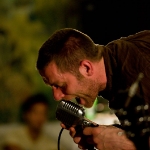
David Ford |
LATEST GALLERY IMAGES
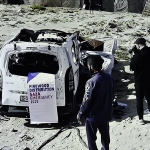
Charity Workers Massacred 
We Bombed A Hospital |
|
Advertising
|
|


